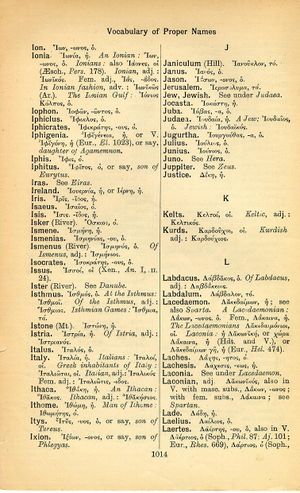Ixion
ἐν μὲν γὰρ εἰρήνῃ καὶ ἀγαθοῖς πράγμασιν αἵ τε πόλεις καὶ οἱ ἰδιῶται ἀμείνους τὰς γνώμας ἔχουσι διὰ τὸ μὴ ἐς ἀκουσίους ἀνάγκας πίπτειν → in peace and prosperity states and individuals have better sentiments, because they do not find themselves suddenly confronted with imperious necessities
English > Greek (Woodhouse)
Ἰξίων, -ονος, or say, son of Phlegyas.
Latin > English (Lewis & Short)
Ixīon: ŏnis, m., = Ἰξίων,>
I the son of Phlegyas (acc. to others, of Antion or of Jupiter), king of the Lapithæ in Thessaly, and father of Pirithoüs. He murdered his father-in-law, to avoid paying the nuptial presents; and as no one would absolve him after such a deed, Jupiter took him into heaven and there purified him. When, notwithstanding this, he made an attempt on the chastity of Juno, Jupiter substituted for her an image of cloud, with which he begat the Centaurs; but having boasted of his imaginary criminal success with Juno, Jupiter hurled him into Tartarus, where he was bound fast to an ever-revolving wheel, Ov. M. 4, 465; 10, 42; Verg. A. 6, 601: Ixione natus, i. e. Pirithoüs, Ov. M. 12, 210: Ixione nati, the Centaurs. id. ib. 12, 504.—
II Derivv.
A Ixīŏnĭus (-onĕus), a, um, adj., of or belonging to Ixion: Ixionei rota orbis, Verg. G. 4, 484: Ixionii amici, Lampr. Heliog. 24.—
B Ixīŏnĭdes, ae, m., son of Ixion, i. e. Pirithoüs, Prop. 2, 1, 38.—In <number opt="n">plur.</number>: Ixīŏnĭdae, ārum, the Centaurs, Luc. 6, 386; Ov. M. 8, 566.

